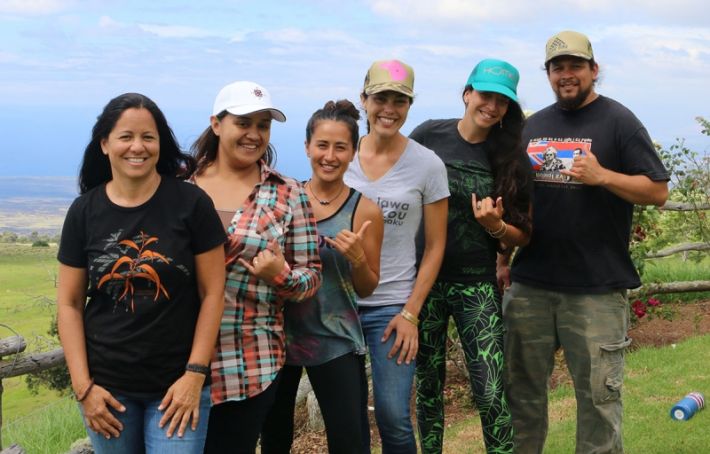Kamehameha Schools and its partners are cultivating native leaders to care for Hawaiʻi’s natural and cultural resources through the First Nations’ Futures Program (FNFP).
These emerging leaders will learn to bridge modern and traditional knowledge to help build community capacity for generations to come. The 2016-2017 cohort of the fellowship program encompasses a diverse group of professionals including a natural resource manager, an environmental educator, and a cultural specialist.
The cohort is currently preparing for the first phase of the fellowship: a two-week stint at Stanford University’s Woods Institute for the Environment. At Stanford, the group will take part in the First Nations’ Futures Institute – the program’s academic component focusing on environmental sustainability.
“We will meet up with our Maori and Alaska native cousins where we will share, learn and grow together,” explained program director William Awa, Jr., a KS land education administrator.
“The program has and continues to develop a strong network of fellows, many of whom frequently work with one another.”
After their studies the fellows will take part in place-based projects in Hawai‘i that enable them to apply what they learn.
The First Nations’ Futures Program was initiated in 2006 by Kamehameha Schools, working in partnership with another first nations institution – Te Rūnanga o Ngāi Tahu, of Aotearoa.
Today, the international alliance includes partners Sealaska/First Alaskans Institute, Stanford University Woods Institute for the Environment and the University of Hawai‘i at Mānoa Center for Hawaiian Studies.
The 2016-2017 FNFP Cohort
Fellows recently attended an orientation where they met and learned about each other and decided on the name of their papa (close-knit group). The inoa (name) selected was Aloha ‘Āina, a love for one’s land or country.
In describing why the cohort chose that particular name, Papa Aloha ‘Āina said in a statement:
“Aloha ‘Āina are not words that merely sit on the tip of one’s tongue. Aloha ʻĀina is not just a practice, but a way of life. It is the foundation of who we are as Kānaka ‘Ōiwi (native people) of Hawaiʻi. Our entire group strongly believes that Aloha ‘Āina is the core value that all indigenous leaders must possess. Living the values of our ancestors and having connections to the land on which we reside, work, and gather resources are rudimentary functions of living Aloha ʻĀina.”
The Hawai‘i members of Papa Aloha ʻĀina (2016-17) are:
Kapua Lililehua Chandler KSK '08
The Kaua‘i native holds a bachelor’s degree in computer science and mathematics from the University of Portland (Ore.), as well as a Master of Education degree in educational administration with a focus on Higher Education from UH Mānoa. She is currently pursuing a doctoral degree at UCLA in higher education and organizational change.
ʻĀnela Marie Kawehikulaonālani Evans KSK '03
A native of Lānaʻi, Evans earned bachelor’s and master’s degrees in Hawaiian studies at UH Mānoa. Evans currently serves as an assistant manager in the Culture and Historic Preservation Division with Pūlama Lānaʻi where she engages community members and visitors in the stewardship of Lānaʻi’s cultural and natural resources.
Makana Kahaʻuleli KSK '85
Kaha‘ulelio earned a bachelor’s degree in interdisciplinary studies from UH Mānoa. Prior to earning her degree, she started a business to develop leadership skills, team engagement and environmental literacy in schools and youth organizations. She currently serves as the Hawai‘i state coordinator for Project Learning Tree, a national environmental education curriculum.
Shaelene Kuʻulei Kamakaʻala KSK’05
Kamaka‘ala holds a bachelor’s degree in political science from the University of San Diego as well as a Juris Doctor Degree from UH Mānoa’s William S. Richardson School of Law. She is rooted and active in her community as the joint-co-founder of the Kahana Kilo Kai program which is dedicated to building the community’s capacity to restore Kahana’s konohiki fishery and bring abundance back to the bay.
Lāiana Kanoa-Wong
The Kahalu‘u resident is a product of the kula kaiapuni Hawaiian immersion system and graduated from Ke Kula Kaiapuni ʻo Ānuenue as valedictorian. He earned his bachelor’s degree in ʻōlelo Hawaiʻi and a master’s degree in education from UH Mānoa. Kanoa-Wong currently works as a cultural specialist at Kamehameha Schools where he helps revitalize the Native Hawaiian language and culture organization-wide for haumāna and KS staff statewide.
Sanoe Marfil
A proud graduate of Nānākuli High School, Marfil continued her education at UH Mānoa and earned a bachelor’s degree in humanities with a focus on Hawaiian Pacific studies. For the past 10 years, she has worked at the Institute for Native Pacific Education and Culture (INPEACE) and perpetuates Hawaiian culture by designing and creating curriculum and activities to instill knowledge, appreciation and necessary skills for professionals, families and individuals of all ages.
For an in-depth look at the program to see a list of past cohort members, read the story in KS’ I Mua Newsroom or go to www.fnfp.org.
The First Nations’ Futures Program
The First Nations’ Futures Program (FNFP) was initiated in 2006 by Kamehameha Schools, working in partnership with another first nations institution – Te Rūnanga o Ngāi Tahu, of Aotearoa.
Today, the international alliance includes partners Sealaska/First Alaskans Institute, Stanford University Woods Institute for the Environment and the University of Hawai‘i at Mānoa Center for Hawaiian Studies.
The vision for FNFP is to develop well-balanced indigenous leaders who serve their communities through vital work in public or professional roles. Fellows are selected based on their past service to their people and potential to contribute even further. They will be a part of an international leadership network and are expected to apply the experiences towards the betterment of their people.
To learn more, visit www.fnfp.org.

FNFP's Aloha ʻĀina cohort complete their program orientation at Hualālai Ranch. Fellows will next head to Stanford University for a two-week academic institute. Fellows (L to R): Makana Kahaʻuleli, Sanoe Marfil, Shaelene Kamakaʻala, ʻĀnela Evans, Kapua Chandler and Lāiana Kanoa-Wong.
Related stories
TAGS
first nations' futures program,
leadership,
servant leadership,
hawnleaders
CATEGORIES
Kaipuolono Article, I Mua Kamehameha, Newsroom, Department News, Controller
Print with photos
Print text only










